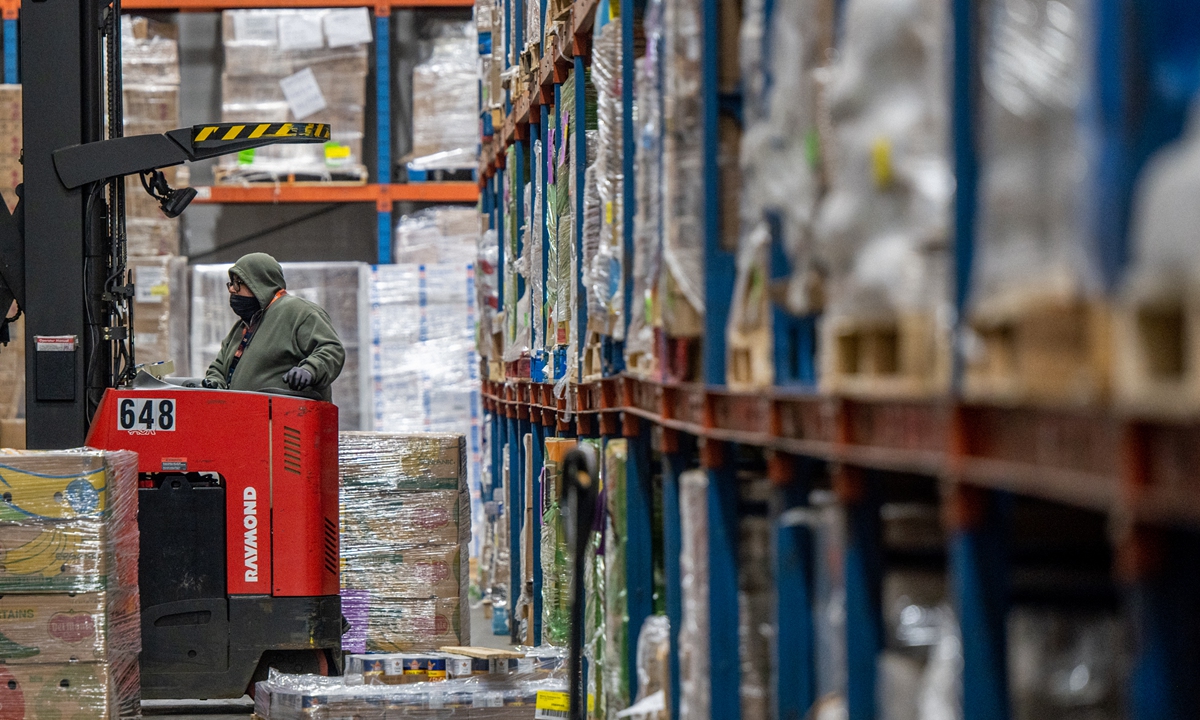Real problem with US constellation of tariffs is damage on multiple aspects of economy: Stephen Roach
Besides tariffs on consumer goods, those on industrial materials and others are real problems

Editor's note:
After sticking to former US President Donald Trump's trade war approach toward China for over a year, US President Joe Biden, recent media reports suggest, may finally be ready to at least roll back some of the punitive tariffs on Chinese goods. Still many details remain unclear, including whether Biden will remove the tariffs as reported and how much of these tariffs will he remove. Stephen Roach, a senior fellow at the Paul Tsai China Center of the Yale Law School and former Chairman of Morgan Stanley Asia, has long been calling for the removal of all the additional tariffs, with a forthcoming book advocating for a new approach in US trade policy toward China. In a recent interview, the Global Times (GT) spoke to Roach about the US tariff decisions.

Stephen Roach, a senior fellow at the Paul Tsai China Center of the Yale Law School and former Chairman of Morgan Stanley Asia. Photo: Courtesy of Roach
GT: Recently there are media reports saying that the US President Joe Biden may take moves to roll back some of the punitive tariffs levied on Chinese goods during the trade war. What's your take on the issue?
Roach: The public news reports stress the political aspect of this decision. There are some in the Biden administration led by Treasury Secretary Janet Yellen, that believe President Biden should take any actions that might help the US' inflation problem, and the tariffs are part of that. And then there's another group of advisors led by the US Trade Representative Katherine Tai, who believe that tariffs represent an important aspect of leverage that the US still has on China. There's a battle going on between these two points of view.
My own opinion is that a partial rollback focused on the consumer goods, which would feed into the sharply elevated CPI inflation rate, does have political appeal for a president who is being criticized a lot in public opinion polls for allowing inflation to become such a serious problem in the US.
Unfortunately, only a small aspect of the tariffs is directly on consumer products. The estimates I've seen showed that it would impact less than 5 percent of the items covered in the consumer price index (CPI), so there's very little relief to inflation that would come from this action. It would largely be a cosmetic step that the president could speak to when he addresses the American public about this problem.
But the real problem with tariffs is not the specific tariffs that bear down on consumers, but the broad constellation of tariffs that hit consumer products, industrial materials, supplies, capital equipment and the sanctions on Chinese companies that are alleged to have committed unfair trading practices.
There's a much better way to address these problems than to go about it this way, and the Biden administration has thus far been reluctant to take more meaningful steps in doing it.

An employee organizes products at the Houston Food Bank facility on February 08, 2022 in Houston, Texas. Photo:VCG
GT: In terms of the impact of additional tariff on CPI, what if the entire additional tariffs were removed? How much would that help?Roach: In my new book, I made a calculation that if the US were to eliminate all of the tariffs that were placed on China during the trade war, that would roll back the current tariff rate from 16.3 percent on some $333 billion of goods that we put tariffs on to about 3.2 percent, and that would produce a saving of about $54 billion, which is a significant savings.
If China were to match that and reduce the retaliatory tariffs on some $88 billion of US products from about 21 percent back to 8 percent, it would lead to tariff reductions of about $11 billion. So, the sum total of US reductions and Chinese reductions would be worth about $65 billion in savings to the American economy; and that's a significant support to an economy that is now suffering the pressures of this trade war.
GT: For the sake of the global economy, what can China and the US do? What's your suggestion?
Roach: My suggestion, as I detail in my new book, Accidental Conflict: America, China, and the Clash of False Narratives, is that both nations, need to recognize that their economic relationship is in serious trouble. In the short span of five years, we've moved into a trade war, a tech war, and there's been an escalation of very confrontational rhetoric that is very reminiscent of a new cold war— an especially worrisome development in light of geopolitical tensions with the South China Sea, Taiwan Straits, and with war raging in Eastern Europe.
I stress in this new book that we need a new approach to manage our relationship in a way that makes a positive contribution to the global economy rather than one that focuses on confrontation, decoupling, which create negative forces on the global economy.
GT: There have been a lot of concerns raised about inflation and the possibility of a recession with regard to the US economy. You said in June that a stagflation was making a comeback. In light of recent data, do you think that the US is getting closer or further away from a stagflation?
Roach: Stagflation is the combination of slowing growth and high inflation; in particular, stagflation reflects a growth rate that slows well below trend, which is then associated also with rising unemployment. I personally think that the US will be lucky if it gets away with stagflation, but the more likely outcome is probably a recession, which is a worse outcome than stagflation because it means that the price for inflation control is a contraction in economic activity and more sharply rising unemployment.
But I think, at a minimum, given the persistence of high inflation in the US and the likelihood that the Federal Reserve has made a major mistake on monetary policy and therefore has much more to do in terms of tightening of interest rates, that the economy will slow sharply during a period of persistent inflation. That does put me in the stagflation camp, but stressing the risk that it could be worse than that.
GT: The slowing growth with rising inflation, is this going to be a long-term issue? And specifically, you mentioned that the Fed made a mistake, but going forward, do you foresee any policy shifts from the Fed in terms of addressing these risks?
Roach: If the Fed moves in a decisive and determined way to raise interest rates by half a percentage point in each of the four remaining policy meetings of this year, it would take the benchmark policy rate up to roughly 4 percent by the end of this year. But unfortunately, it would still be below what I think is a reasonable expectation for the inflation rate at the end of this year, which is the essence of the problem.
The Fed needs to get the nominal policy rate, the federal funds rate, above the year-over-year inflation rate. And this, in essence, is the source of the dilemma: The Fed failed at inflation control by holding on to zero interest rates for too long. That means it has a considerable way to go to put policy in a position where it holds back excess demand and begins to have a more material impact on inflation.
I think that will happen in 2023, and whether the economy slow sharply or goes into a recession remains open to debate. But I think as that force begins to take hold, then inflation will begin to moderate. However, I don't see inflation going back to the pre-COVID 2-percent rate that was in line with the Fed's long-term target.
And that raises the second aspect of your question: will there need to be a rethinking of a Fed policy? I think most assuredly that has to happen. It was very unfortunate that the Fed Chairman Jerome Powell proudly announced this new average inflation targeting framework in the summer of 2020 during the COVID shock and supply chain disruptions. This gave the Fed the unfortunate excuse of ignoring the early signs of a major surge in inflation, dismissing them incorrectly transitory and narrowly focused. There is no place for average inflation targeting in the type of environment we're in right now in the US and globally, especially with all the supply chain and de-globalization pressures currently bearing down on many of the key forces that held inflation so low for so long.
GT: If things will get as bad as many predict, what does that mean for the global economy, specifically for emerging markets? There are a lot of concerns around the world about the state of the US economy and the spillover effect.
Roach: The US is the largest economy in the world, and China is the second largest. Both are facing downward pressures on economic growth, in many cases for different reasons. But there's no other major source of economic growth that is going to fill the void left by weakness in both of the world's two largest economies.
The IMF has recently lowered its sights on global growth for this year, cutting the estimate six months ago by 1.3 percentage points to 3.6 percent.
I think that's the third largest six-month revision since the IMF has been doing global growth forecasts, and most likely there will be more downward revisions to come. And for export dependent developing economies, this is a very problematic outcome. Normally we associate global recession with world economic growth that falls below the 2.5-percent threshold. We're still about a point away from that, but we could get very close before the downward revision cycle comes to an end. And that would be very problematic for externally dependent export-led emerging economies around the world.
